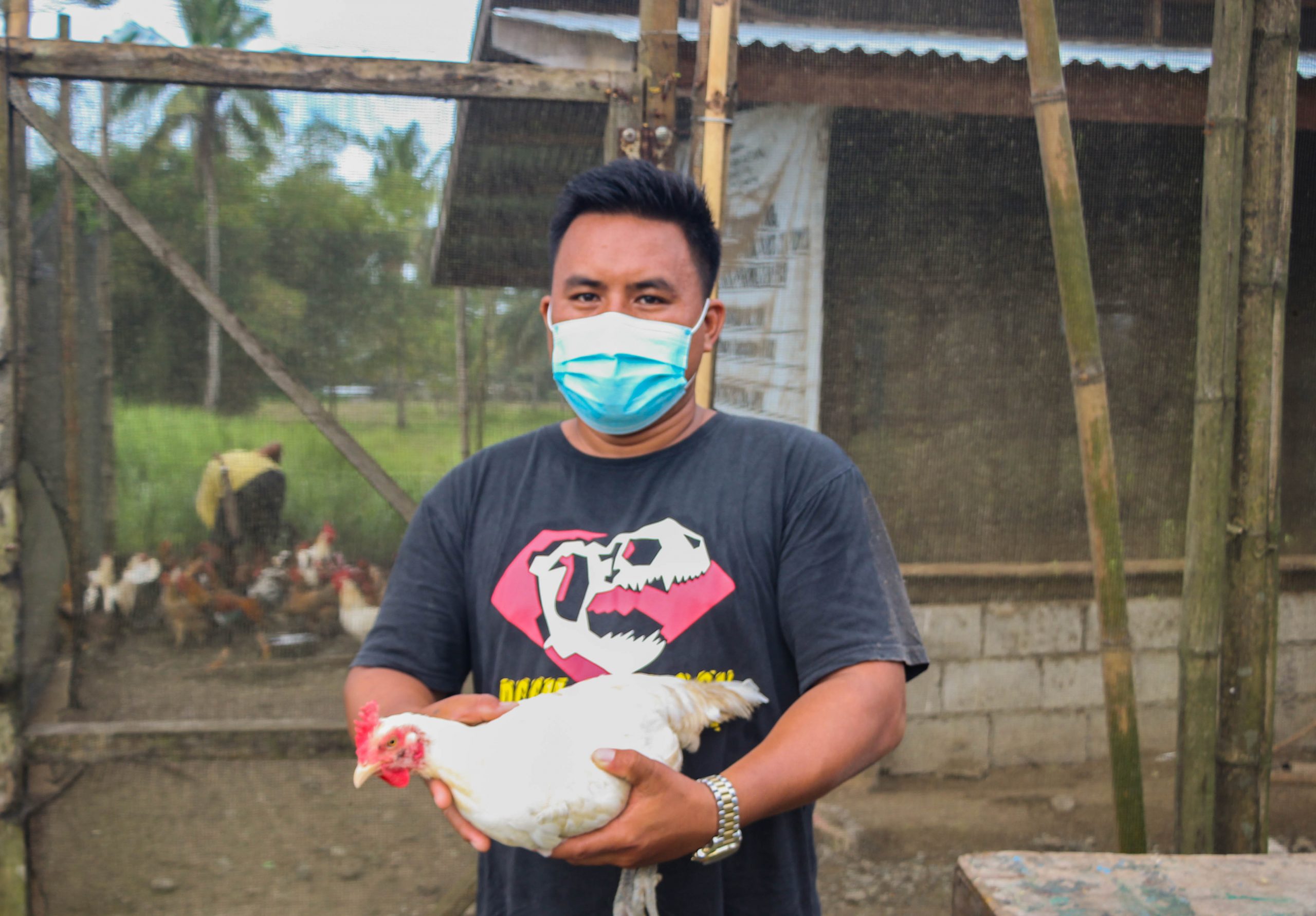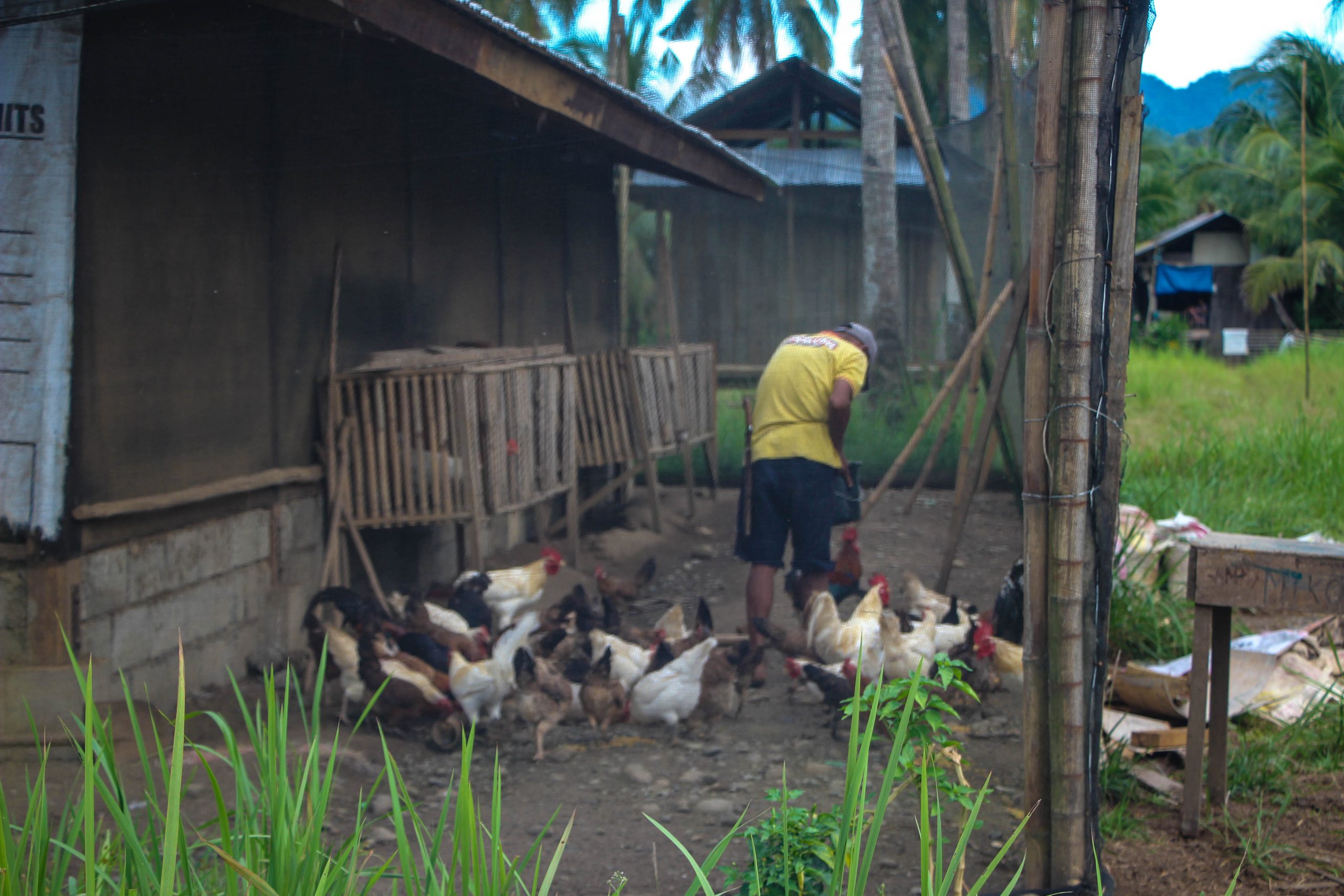Rice and corn production have been the primary livelihoods of the Cancavan Corn Growers Association (CCGA), a SAAD-funded farmers’ group in Carmen, Surigao del Sur. The first half of the year beginning March is for corn planting while rice is for November. While these practices are fixed in the community, they leave some farmers idle when heavy rainfall floods the lowland areas.
The climate in Surigao del Sur is characterized by year-round rainfall with an annual precipitation of 4175 mm. This phenomenon results in light to moderate flooding beginning in November and ending in June that only rice can withstand, according to association president Rezie Mollaneda.
“In Cancavan, most lowland areas suitable for rice and corn are flooded by the end of the year. This is the reason why we readily take any opportunity, be it producing other crops in upland areas or raising animals, to support our families’ needs,” shared Rezie.
This is where the Native Chicken Production Project of the Special Area for Agricultural Development (SAAD) Program of the Department of Agriculture – Caraga has proven useful. Part of assisting small farmers in establishing income-generating livelihoods, the program introduces small farmers to manageable and sustainable livelihoods that can endure the driest or wettest days.
In December 2019, CCGA received 90 native chickens, a poultry house with a perimeter fence, feeds, incubator, water plastic drum, and drugs and biologics all amounting to Php 516,000.00.
As of August 2020, they have earned Php 19,529.00 from eggs and chicks’ sales. Rightfully, it is poultry that assures CCGA members have income even on rainy days.
Making it work
Introducing poultry in a corn-dominated area is not far-fetched; chickens feed on corn, after all. But because the project was relatively new to the community, some locals had their share of reservations.
Rezie recounts that incorporating poultry into their daily routine proved to be challenging. “At the start, the majority of CCGA members were reluctant. Though government support is not new to us, this is the first poultry in the community. It’s not entirely laborious, but it took us time to get the hang of it.”
As found, both economic conditions and community factors affected the success of the interventions. Inputs-wise, the SAAD-funded farm inputs are sufficient to cover the association’s production until 2021. Turns out that the cooperation of the community was another hurdle that CCGA had to face.
“It did not help that people outside the association have had doubts as to the success of the project,” added Rezie. “Here, some locals had inherent doubts with government-funded projects. They were all ears waiting for our downfall. And this affected the mindset of some members. To date, almost half of the members have withdrawn from the project.”
From the original 35 members, the CCGA has been reduced to 20 members (17 males and 3 females), nine months after the poultry kicked off. However, they only need the existing committed members to stand the test of time.
Among the ones who remained committed to the project is Edilberto Frias— a senior, who spends an hour a week at the site to fulfill his tasks.
“I’m a widower and have been advised to take less-demanding tasks. So, I take part in feeding our chickens and in maintaining the poultry house well kept. This is my spare-time activity aside from gardening,” expressed Edilberto.
According to Rezie, poultry is easy, but you have to invest your time and effort for it to thrive.“ As the president, I take it upon myself to lead my members. We have implemented a schedule for everyone to participate in the labor. We have the inputs necessary for the production. It is time and effort that are required of us, especially in monitoring the chickens,” shared Rezie.
As to the status of the project, Rezie admits that they have just begun. “We are through with the adjustment period. With the steady income coming in, we’ll eventually fulfill our goals that include joining the leading suppliers of native chicken products in CarCanMadCarLan (the northernmost quarter of SDS).”
Later this year, the group will receive additional 160 native chickens, which they needed to boost their egg production. These inputs are on top of the vegetable and corn seeds (OPV and hybrid) and fertilizers (complete and ammonium sulfate) which they acquired earlier this year, totaling to an amount of Php 203,594.77.
Diversifying farm produce, which the association is pioneering with the poultry in their community, is an important component of economic growth that also helps achieve food security and increases employment in the rural areas, according to the Food and Agriculture Organization of the United Nations.
For most small farmers, all it takes is an opportunity to make a leap of faith. Truly, CCGA is on the right track. ###
Writer: Mark Angelo Pineda, Information Officer- SAAD Caraga
Copy editor: Natalianne Marie Delos Reyes, PR & Comms Officer- SAAD NPMO



Comments (0)